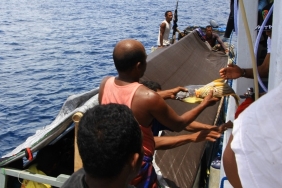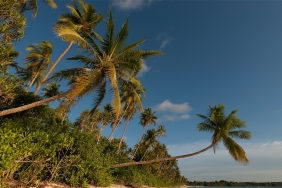WWF SOCIALIZES “SUSTAINABLE SEAFOOD” IN @AMERICA
By: Masayu Yulien Vinanda
Jakarta (13/01)- This semester, WWF-Indonesia will be launching Sustainable Seafood campaign. Marking the beginning of the campaign, WWF-Indonesia and Divemag magazine organized a film showing and discussion about “Choose Your Seafood Right,” on 11-12 January 2011 in @ America, Pacific Place, Central Jakarta.
Hundreds of habitatants of the capital comprising of divers, Marine Buddies members (social community of all marine lovers and divers), WWF-Indonesia supporters, highschool and university students, volunteers, and general public shared their knowledge and thoughts regarding sustainable seafood.
“f you make careful choices when enjoying your seafood while learning more about how fisheries should be managed we all contribute to ensuring healthy oceans for the future,” Corporate Campaigner for WWF-Indonesia Marine Program, Margareth Meutia said.
We don’t realize that some seafood that we have on the menu at our homes or restaurants are caught in an unstainable or destructive way. For instance, shark, grouper, and lobster.
“Grouper have very slow growth rate and sexual maturity. Therefore, they are vulnerable to overfishing and coral reef habitat destruction. Moreover, lobster and grouper are often caught using poison. It also kills other marine species and destroys coral reef,” Margareth added.
“I believe that public awareness activities are urgently needed. Both for public and group of fishermen. I once joined a beach-exploring activity. There was a fisherman offered us a shark fin. Since at the time I didn’t know that shark is endangered species, I consumed it,” said Glen, one of the discussion participant from London School for Public Relation (LSPR).
At the same occasion, WWf-Indonesia also presented the seafood guide explaining selection of sustainable and environmentally friendly seafood. The handy pocket guide is separated into three categories, red, yellow, and green. Consumers are advised to stop purchasing sea food and fish which fall under “red category.” Fish under “yellow” category can be consumed in moderation, and those under “green” category should be the focus of public consumption.





